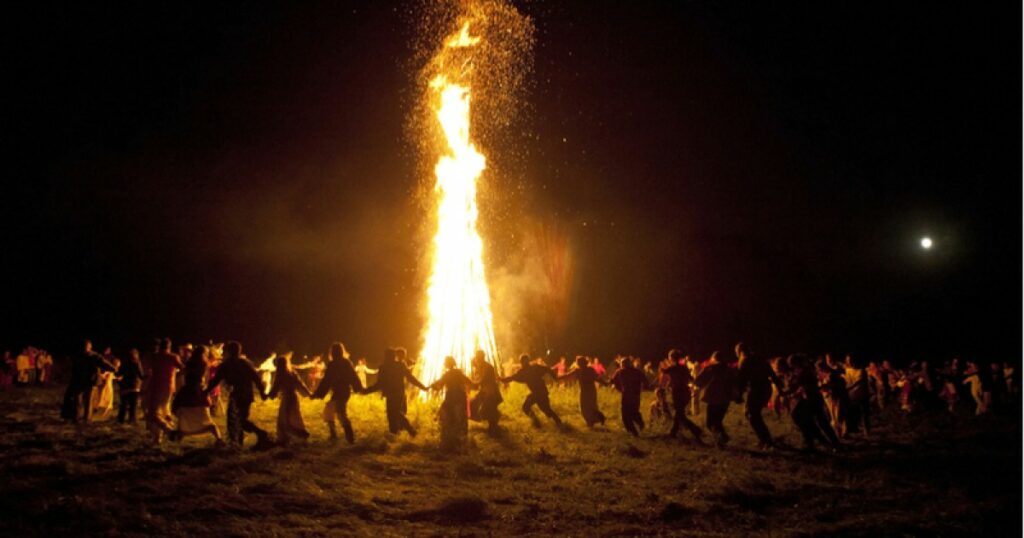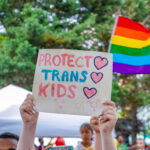Blog Post
We are entering a new pagan age
By Jonathon Van Maren
In his 2020 book, The Final Pagan Generation: Rome’s Unexpected Path to Christianity, Edward J. Watts details daily life at the end of an age. It was the early 300s, and the final pagan generation, he writes, “was born into a vast sacred infrastructure that had been built up over the past three millennia.” The gods were everywhere, woven into the language, commerce, daily rituals, and the very landscapes of every city and town. The gods were an omnipresent and accepted assumption. Many of the Roman elites no longer believed in the literal existence of these deities, but they were seen as necessary myths—a foundational part of the social order. Nobody could anticipate how swiftly everything would change.
Watts begins by describing a face-off in Alexandria in which pagans, enraged by the conversion of their ancient shrine into a church, rioted in the streets, killed and wounded several Christians, and barricaded themselves in their shuttered temple until the emperor promised them a pardon. When they left the Serapeum, the Christians tore it apart, triggering a wave of idol-smashing across Egypt in the weeks that followed. It was a watershed moment in which many pagans finally realized that their empire was being remade and that “Christian attacks could reach the most permanent and impressive elements of the urban religious infrastructure.” By the “final pagan generation,” Watts is referring to the last of the elite Romans, both pagan and Christian, “born into a world that simply could not imagine a Roman world dominated by a Christian majority.” None could grasp that they stood at the dawning of a new age and that all the old things were passing away.
Many now argue that we stand at a similar threshold today. In the West, we are at the end of 1,600 years of Christian civilization. The culture—and the foundational underlying assumptions—have all changed, and people have passed from Christendom into a new world.

The French philosopher, historian, and novelist Chantal Delsol believes that we are not simply becoming post-Christian; rather, we are re-paganizing. In her 2021 book, La Fin de la Chrétienté (The End of the Christian World), she observes that we have yet to fully understand what we are living through: nothing less than the death throes of a civilization that lasted 16 centuries. This slow-motion death began with the French Revolution, she argues, which—unlike the Dutch and American revolutions—produced the first civilization that did not rest on Christian assumptions. Once Christianity faced off with modernity, Delsol says, the handwriting was on the wall. And even though a handful of elites deluded themselves into believing in the future of atheism, most people need gods—and soon the old gods began to creep back in.
Our new society, in fact, still has ‘saints’ and ‘sinners.’ They have simply swapped places. Christians who condemn unbiblical sexual behavior are damned as ‘wicked’ for their intolerance, while the gilded homosexuals of our celebrity elites are instead celebrated for ‘being who they are.’ This change seems to have happened rather suddenly, facilitated by the fact that even those who no longer believe in Christianity have continued its cultural practices—even as the end of the age was approaching. When the end finally came, it seemed to happen overnight. In 2008, U.S. President Obama ran for office opposing same-sex marriage, but a mere decade and a half later, in 2022, most Democrats wouldn’t dare question the ritual mutilation of children in the name of transgenderism. And much like the pagans of the 4th century, Christians have simply been caught off-guard.
Unlike the majority of Christian intellectuals, however, Delsol does not believe that the collapse of Christianity will necessarily be accompanied by darkness and chaos. I would argue that this depends on how one defines “darkness and chaos.” For example, Delsol does not think abortion should be banned in a non-Christian society; but in my mind, any culture—whether explicitly Christian or not—returning to the infanticide practices of paganism is already living a dark, bloody nightmare filled with obliterated children.
The 4th century has lessons for us here as well. It was the Christian condemnation of abortion and infanticide that brought about a prohibition of these practices by Emperor Valentinian in 374 AD. Even a secular conception of human rights, however, ought to recognize that abortion is unjust to all those involved, above all the unborn human whose life is being ended. Indeed, one may reasonably argue that human beings possess human rights from the beginning of their lives, which science has incontrovertibly established begins at conception. You don’t need Christian eyes to read an embryology textbook or view an ultrasound.
Among the various examples of alternative religious systems that have filled the vacuum left behind by the decline of Christianity, Delsol notes that even environmentalists have their liturgies and, in many ways, are engaged in a form of worship of Mother Earth. As Delsol noted in a 2021 essay:
We are at a stage where, in the vast field opened up by the erasure of Christianity, new beliefs waver and tremble. Disaffection with dogmas, or with a decreed and certain truth, brings about the triumph of morality. It stands alone in the world. We see philanthropy at work, a love for humanity directly inherited from the Gospel, but without the foundations. Late modernity takes up the Gospel, but strips it of all transcendence. …
[I]n pagan societies, religion and morality are separate: religion demands sacrifices and rites, while the rulers impose a morality. This is the situation we are in the process of rediscovering: our governing elite decrees morality, promotes laws to enforce them partly through insults and ostracism. Our morality is post-evangelical, but it is no longer tied to a religion. It dominates the television sets. It inhabits all the cinematography of the age. It rules in the schools and families. When something needs to be straightened out or given a new direction, it is the governing elite.
In short, Delsol writes: “We have returned to the typical situation of paganism: we have a state morality.” However, she does not believe attempts at cultural transformation by Christians will be successful. The die is cast and the wheels of ‘progress’ grind forward. Instead, she suggests, like the pagan communities that struggled to survive for centuries after the rise of Christianity, we have to find ways to live in this new society—as strangers in our homelands. Christians, says Delsol, must become witnesses to another way of living—salt and light, as the Scripture puts it. “The experience of our fathers brings us certainty,” she says. “Our business is not to produce societies where ‘the Gospel governs states’ but rather, to use the words of Saint-Exupery, to ‘walk very slowly towards a fountain.’” Recently, Delsol was kind enough to answer additional questions about her thesis.
You’ve written that the West is re-paganizing. When did you first identify this trend? And where would you place the chronological end of the Christian era?
Paganism, a belief in immanent gods, never completely disappeared from the Christian landscape. These gods appear naturally in the human mind and imagination. And, if Christianity put them backstage and deprived them of their legitimacy, it did not manage to annihilate them. We can cite a number of schools of thought and Western authors who were tempted by this reasoning, from Freemasonry to the New Age through Spinoza and Nietzsche. In Science as a Vocation, Max Weber described these gods lurking in the corner; still alive and ready to return at the smallest sign of weakness in transcendent monotheism.
As soon as doubt or disinterest in the dominant Christian religion develops, the temptation of paganism reappears. Read Montaigne, for instance. I believe that, since the Renaissance, many authors in Christian countries were no longer believers, even though they could not express their doubts openly. But the cracks became larger several centuries ago, and multiple revolutions in the 18th century placed an emphasis on the process of reassessment.
READ THE REST OF THIS INTERVIEW AT THE EUROPEAN CONSERVATIVE








